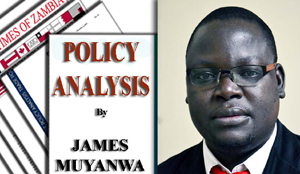 WHENEVER I visit my home town, Kabwe, my mind always wanders away into memory lane.
WHENEVER I visit my home town, Kabwe, my mind always wanders away into memory lane.
This week was not an exception and I could not help but find my mind drifting into history, wondering as to what had become of the declaration of the former mining town as a tax-free zone.
Instead of reinventing the wheel on the matter, however, I have decided to revisit the write-up I did on Kabwe sometime last year.
More than a decade ago, Kabwe was, along with other towns like Livingstone in Southern Province, Ndola and Luanshya on the Copperbelt, declared a tax-free area by then Republican President Frederick Chiluba.
From my basic research, a tax-free zone (or area) is a place designated by the Government to encourage new business investment with the objectives of creating jobs and local economic development.
That definition, however, leaves out one important element, the tax.
Therefore, the more apposite meaning of tax free zone would be: “A region (or district) within the country in which customs duties and other types of indirect taxes are not applicable.”
The economic players within the tax free-zone are exempted from paying the relevant taxes to the Government as a way of attracting and retaining investments.
Thacerefore, given what Kabwe had become by early 2000s, following the closure of the mine in 1994 – and other companies later, the move by the Government then was worthwhile.
Some years later, however, late President Levy Mwanawasa said in July 2004 that the declaration of the involved towns as tax-free zones by the former administration had not yet been implemented.
Mr Mwanawasa had said the tax-free zones had not been effected because of certain technicalities which were still being addressed by his Cabinet.
Four years later, a report by Chrispin Rodaka Matenga, a researcher, indicated that “the modalities of the setting up of a tax free zone are still being worked [on] and benefits yet to be realised.”
The report titled: “Rapid Assessment of Child Labour in Non-Traditional Mining Sector in Zambia,” also reveals that only six manufacturing industries had remained operational by that time.
Obviously, this is a sad story especially for Kabwe, which out of the districts which were declared tax-free zones, was seemingly the hardest hit by the effects of the liberalised economy and still seems
incapable to recover from the blow.
As Kabwe Central Member of Parliament James Kapyanga said in his maiden speech to Parliament in 2011, apart from the closure of the mine, the deplorable economic state of Kabwe can be attributed to
closure of other firms.
These firms include Mulungushi Textiles, Small Industrial Development Organisation (SIDO), General Pharmaceuticals Limited and Kabwe Milling Corporation coupled with the then underperformance of the Zambia Railways Limited (ZRL).
This state of affairs even earned the town the term of “Ghost Town” at one time.
While the re-opening of the mine in Luanshya seemed to have returned some semblance of economic occupation to that town, with the boom of the hospitality industry driving the Livingstone economic recovery, Kabwe has not been that blessed.
It has not even gotten the full benefits from the revival of ZRL, which has been headquartered in the Central Provincial capital, because, unlike mining, railway operations are dotted along the line of railway not just in one town.
Therefore, if there is no need to implement the tax-free zone system in other towns, which I believe is still law, it is inevitable that the Government does so for Kabwe, to salvage the area from further economic miseries.
According to Mr Matenga’s report, following the demise of the lead and zinc mining activities, the manufacturing and transport sectors are now the largest employers in the formal sector, followed by the energy, agriculture and the commercial sectors.
In addition to the closure of the mines, the closure or privatization of other key industries has pushed quite a large segment of individuals from formal employment into the informal sector.
This has definitely led to the erosion of incomes, as is always evident during my visit, affecting the viability of many businesses including agriculture.
The population’s buying power, especially the urban population, declined – seriously prompting disinvestment from the district.
The resultant informal sector, heavily reliant on trade and harvest of natural resources like fish, charcoal and timber, albeit at small scale, has spread alongside street vending.
For comments call: 260 0955 431442, 0977 246099, 0964 742506 or email: jmuyanwa@gmail.com.






